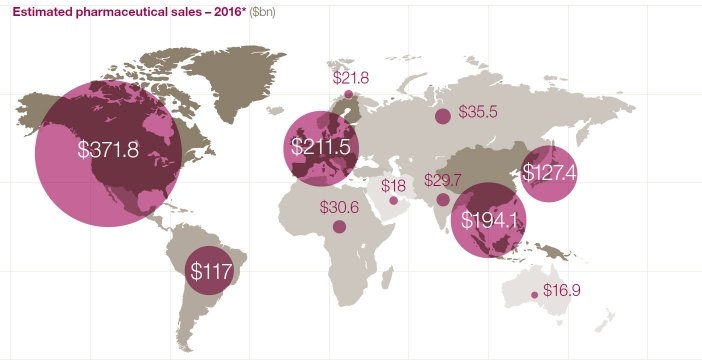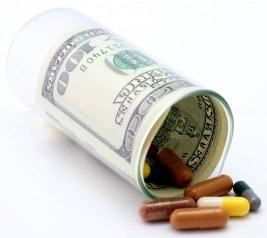The industry of marketing and advertising is one of mankind’s oldest professions, seen in its simplest form such as a sign in a window, to more complex methods, synonymous with name brand recognition. Canadian
healthcare industry is also an active participant in this age-old practice, pushing the use of particular medications that benefit the big pharmaceutical companies, all in the pursuit of higher profits.

Some may be familiar with
pharmaceutical representatives that visit doctors on a weekly basis, often sharply dressed, smooth talking individuals who get to see the doctor as soon as they enter the clinic doors. Their main job is to inform and educate the in-house physician about the latest and greatest pharmaceuticals for the particular ailment they are tasked to promote. This could be from the newest blood pressure medication to the newest erectile dysfunction treatment; as long as the big pharma company is making it they want to sell it.
The biggest hurdle is getting patients to shell out their hard earned cash to continuously purchase these medications, as most newly developed pharmaceutical drugs come at a premium due to the large cost invested in research and development. They achieve this by providing physicians
free samples of a particular medication to be given to patients, in the hopes that with their next refill they will be more inclined to pay for it.
While this practice of providing patients with a “
try before you buy” mantra is nothing new, it definitely works, helping propel the prescription drug business into the multi-billion dollar industries they are today. It is estimated that pharmaceutical companies spend approximately
$20 billion dollars a year on marketing to physicians, while prescription drug sales may reach an estimated
$300 billion. But free samples also have additional effects on the prescribing physician, as an article written in the Journal of the American Medical Association by Dr. Ashley Wazana of McGill University, analyzing the prescribing behaviors of doctors in Canada, Australia, New Zealand, Holland and the United States, found that physicians were significantly more likely to prescribe a specific drug if they were given free samples to give to patients previously and were more likely to request hospitals to place a drug on a hospital's official prescribed drug list, much to the delight of drug manufacturers.

Pharmaceutical company marketing strategies have even gone as far as request doctors to write prescriptions with “
no substitutions” on them making pharmacies obligated to follow the doctors’ orders as written, artificially limiting any alternatives. While patients would hope that physicians choose which medications they prescribe based on well researched and sound evidence, ultimately providing what is best for the patient, and while this still holds true physicians often succumb to the pressures and perceived obligations that big pharma instills, and this is often by design.
"Success is when you get doctors selling the product for you"
Michael Oldani, Former Pharmaceutical Representative
There was a time in Canada, not too long ago where it was common practice for pharmaceutical companies to give extravagant gifts to physicians they had relationships with, from flying them to lavish locations around the globe for conferences, to more subtle appreciations such as sporting event tickets or an expensive dinner. This was done so physician were more likely to prescribe a certain drug over its equivalents that work just as well as their name brand counterparts, and therefore
make more money for the supplier.

This has for the most part been abolished as it was seen to be unethical and immoral to accept enticements by companies looking to promote their merchandise, but remnants still linger even though the practice is generally frowned upon. Guidelines are currently in place to give a clear indication of what is acceptable for pharmaceutical companies to provide their partnering physicians, with physicians expected to
avoid self-interests a must. But then again doctors are only human, and when working long hours, often at the expense of spending time with their friends and families for the sake of their careers, it makes it easy to justify accepting such gifts and that much harder to adhere to public expectation.
While it is difficult for physicians to separate themselves from pharmaceutical enterprise, with some arguing that it is near impossible, upholding a certain degree of integrity; not succumbing to corporate manipulation not only makes doctors inherently trustworthy, but also instills confidence in their patients that they are not simply a tool of marketing; providing solace to hard working doctors that have the best interest of their patients in mind and society as a whole.

 Some may be familiar with pharmaceutical representatives that visit doctors on a weekly basis, often sharply dressed, smooth talking individuals who get to see the doctor as soon as they enter the clinic doors. Their main job is to inform and educate the in-house physician about the latest and greatest pharmaceuticals for the particular ailment they are tasked to promote. This could be from the newest blood pressure medication to the newest erectile dysfunction treatment; as long as the big pharma company is making it they want to sell it.
Some may be familiar with pharmaceutical representatives that visit doctors on a weekly basis, often sharply dressed, smooth talking individuals who get to see the doctor as soon as they enter the clinic doors. Their main job is to inform and educate the in-house physician about the latest and greatest pharmaceuticals for the particular ailment they are tasked to promote. This could be from the newest blood pressure medication to the newest erectile dysfunction treatment; as long as the big pharma company is making it they want to sell it.
 Pharmaceutical company marketing strategies have even gone as far as request doctors to write prescriptions with “no substitutions” on them making pharmacies obligated to follow the doctors’ orders as written, artificially limiting any alternatives. While patients would hope that physicians choose which medications they prescribe based on well researched and sound evidence, ultimately providing what is best for the patient, and while this still holds true physicians often succumb to the pressures and perceived obligations that big pharma instills, and this is often by design.
Pharmaceutical company marketing strategies have even gone as far as request doctors to write prescriptions with “no substitutions” on them making pharmacies obligated to follow the doctors’ orders as written, artificially limiting any alternatives. While patients would hope that physicians choose which medications they prescribe based on well researched and sound evidence, ultimately providing what is best for the patient, and while this still holds true physicians often succumb to the pressures and perceived obligations that big pharma instills, and this is often by design.
 This has for the most part been abolished as it was seen to be unethical and immoral to accept enticements by companies looking to promote their merchandise, but remnants still linger even though the practice is generally frowned upon. Guidelines are currently in place to give a clear indication of what is acceptable for pharmaceutical companies to provide their partnering physicians, with physicians expected to avoid self-interests a must. But then again doctors are only human, and when working long hours, often at the expense of spending time with their friends and families for the sake of their careers, it makes it easy to justify accepting such gifts and that much harder to adhere to public expectation.
This has for the most part been abolished as it was seen to be unethical and immoral to accept enticements by companies looking to promote their merchandise, but remnants still linger even though the practice is generally frowned upon. Guidelines are currently in place to give a clear indication of what is acceptable for pharmaceutical companies to provide their partnering physicians, with physicians expected to avoid self-interests a must. But then again doctors are only human, and when working long hours, often at the expense of spending time with their friends and families for the sake of their careers, it makes it easy to justify accepting such gifts and that much harder to adhere to public expectation.